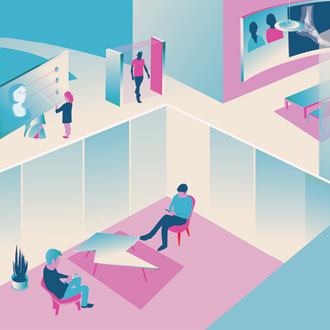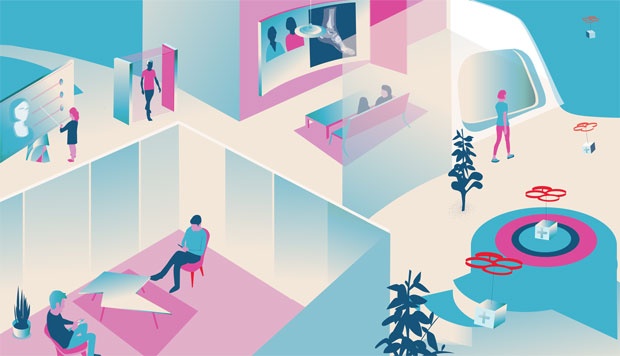What will the GP surgery of 2050 look like?


Data uploading bay
If they haven’t already done so from home, the patient will visit the data bay to upload the information from their personal health devices, such as smartphones, smartwatches or monitors implanted beneath the skin. This will then be analysed to prepare a report on their physical and mental health for the GP before the consultation.
Automatic registration
All patients are recognised and booked in automatically as they enter the surgery, through a biomedical scanner that reads their body temperature and other biomedical parameters, such as heart and respiratory rate and oxygen saturations. This will send an alert to the reception team if a patient attends with signs of a serious acute illness. Anyone requiring a driverless ambulance can be immediately dispatched via a specially designed ‘bed lift’.
Wi-Fi waiting room
Every practice will have high-speed, secure wireless internet free for all NHS patients, to enable information to be exchanged with the patient’s personal devices (tablet, smartphone or smartwatch) and the NHS network. The wireless connection will enable them to review the data they have collected about their health and uploaded to their patient record and, simultaneously, download tailored information to their personal devices, which they can review while waiting to be called in to their appointment.
General practice in 2050
Ten ways medicine will change by 2050
How might general practice look in 2050?
Dr Peter Swinyard’s 2050 predictions: Body scanners, and patients’ permits to be ill
Tim Kelsey’s 2050 predictions: The NHS will still rely on GPs
Group consultations
When they enter the consulting room, the patient will be greeted by the GP and they will sit together in front of a high-resolution screen displaying the patient’s records. Other members of the care team or the patient’s family or carer can also take part via video link if required. The whole consultation will be automatically coded and notes entered into the patient record via intelligent software, so there is no typing required by the GP.
Digital surgery onsite
All rooms in the surgery will be fully adaptable, with adjustable walls and doors. Consultation rooms will sometimes be converted into augmented reality and virtual reality suites for multidisciplinary appointments and meetings. There will also be a fully equipped remote minor surgery suite and digital surgery onsite, for fixing glitches in wearables and implanted sensors and devices.
Drugs by drone
The GP will be able to order medication electronically and have this delivered by drone to a patient’s home by the time the consultation is finished. They will also be able to use the patient’s uploaded biomedical markers and images to produce reports and referral letters while the patient is still sitting next to them.
Dr Ben Riley is a GP in Oxford and medical director of curriculum at the RCGP, and Dr Keith Grimes is a GP in Eastbourne, East Sussex, and the medical director of Health Alert 24



 Oviva’s fully remote Tier 3 Weight Management programme
Oviva’s fully remote Tier 3 Weight Management programme





